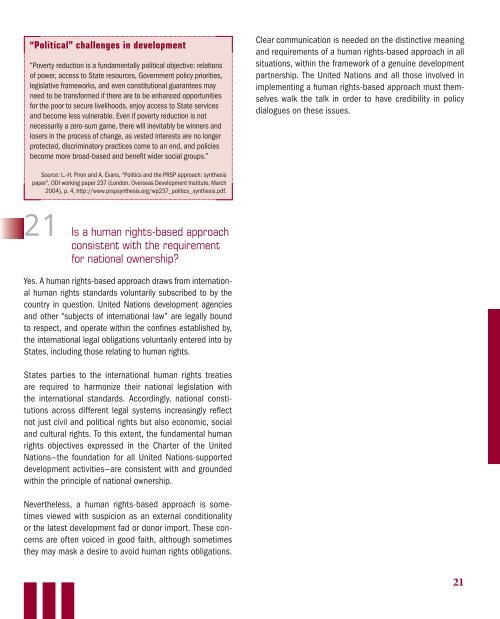Frequently Asked Questions on Human Rights-Based Approach
Frequently Asked Questions on Human Rights-Based Approach
Frequently Asked Questions on Human Rights-Based Approach
- No tags were found...
Create successful ePaper yourself
Turn your PDF publications into a flip-book with our unique Google optimized e-Paper software.
“Political” challenges in development“Poverty reducti<strong>on</strong> is a fundamentally political objective: relati<strong>on</strong>sof power, access to State resources, Government policy priorities,legislative frameworks, and even c<strong>on</strong>stituti<strong>on</strong>al guarantees mayneed to be transformed if there are to be enhanced opportunitiesfor the poor to secure livelihoods, enjoy access to State servicesand become less vulnerable. Even if poverty reducti<strong>on</strong> is notnecessarily a zero-sum game, there will inevitably be winners andlosers in the process of change, as vested interests are no l<strong>on</strong>gerprotected, discriminatory practices come to an end, and policiesbecome more broad-based and benefit wider social groups.”Clear communicati<strong>on</strong> is needed <strong>on</strong> the distinctive meaningand requirements of a human rights-based approach in allsituati<strong>on</strong>s, within the framework of a genuine developmentpartnership. The United Nati<strong>on</strong>s and all those involved inimplementing a human rights-based approach must themselveswalk the talk in order to have credibility in policydialogues <strong>on</strong> these issues.Source: L.-H. Pir<strong>on</strong> and A. Evans, “Politics and the PRSP approach: synthesispaper”, ODI working paper 237 (L<strong>on</strong>d<strong>on</strong>, Overseas Development Institute, March2004), p. 4, http://www.prspsynthesis.org/wp237_politics_synthesis.pdf.21 Is a human rights-based approachc<strong>on</strong>sistent with the requirementfor nati<strong>on</strong>al ownership?Yes. A human rights-based approach draws from internati<strong>on</strong>alhuman rights standards voluntarily subscribed to by thecountry in questi<strong>on</strong>. United Nati<strong>on</strong>s development agenciesand other “subjects of internati<strong>on</strong>al law” are legally boundto respect, and operate within the c<strong>on</strong>fines established by,the internati<strong>on</strong>al legal obligati<strong>on</strong>s voluntarily entered into byStates, including those relating to human rights.States parties to the internati<strong>on</strong>al human rights treatiesare required to harm<strong>on</strong>ize their nati<strong>on</strong>al legislati<strong>on</strong> withthe internati<strong>on</strong>al standards. Accordingly, nati<strong>on</strong>al c<strong>on</strong>stituti<strong>on</strong>sacross different legal systems increasingly reflectnot just civil and political rights but also ec<strong>on</strong>omic, socialand cultural rights. To this extent, the fundamental humanrights objectives expressed in the Charter of the UnitedNati<strong>on</strong>s—the foundati<strong>on</strong> for all United Nati<strong>on</strong>s-supporteddevelopment activities—are c<strong>on</strong>sistent with and groundedwithin the principle of nati<strong>on</strong>al ownership.Nevertheless, a human rights-based approach is sometimesviewed with suspici<strong>on</strong> as an external c<strong>on</strong>diti<strong>on</strong>alityor the latest development fad or d<strong>on</strong>or import. These c<strong>on</strong>cernsare often voiced in good faith, although sometimesthey may mask a desire to avoid human rights obligati<strong>on</strong>s.21
















